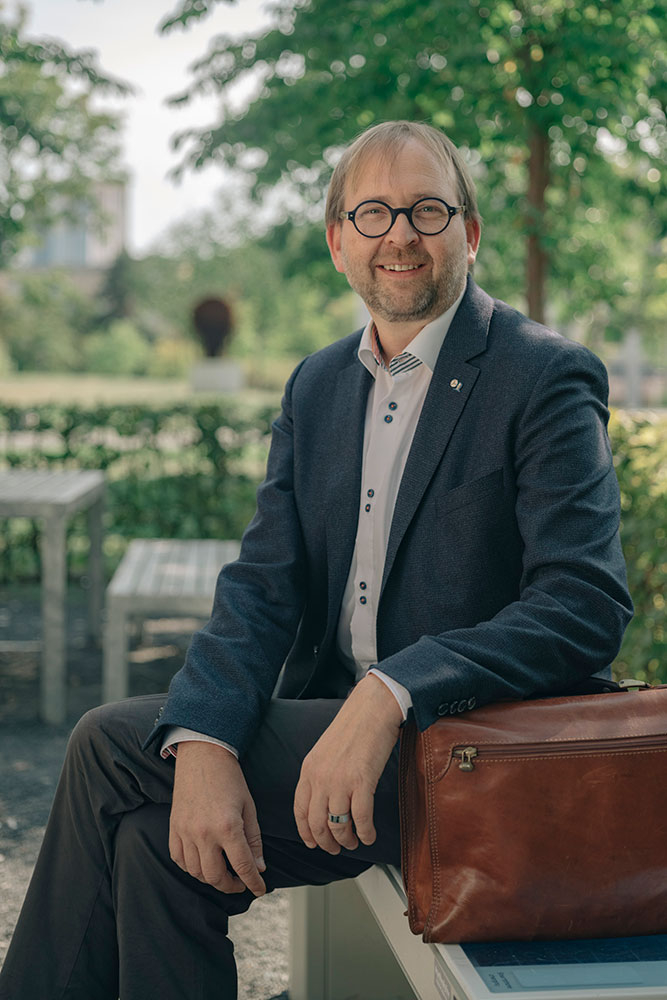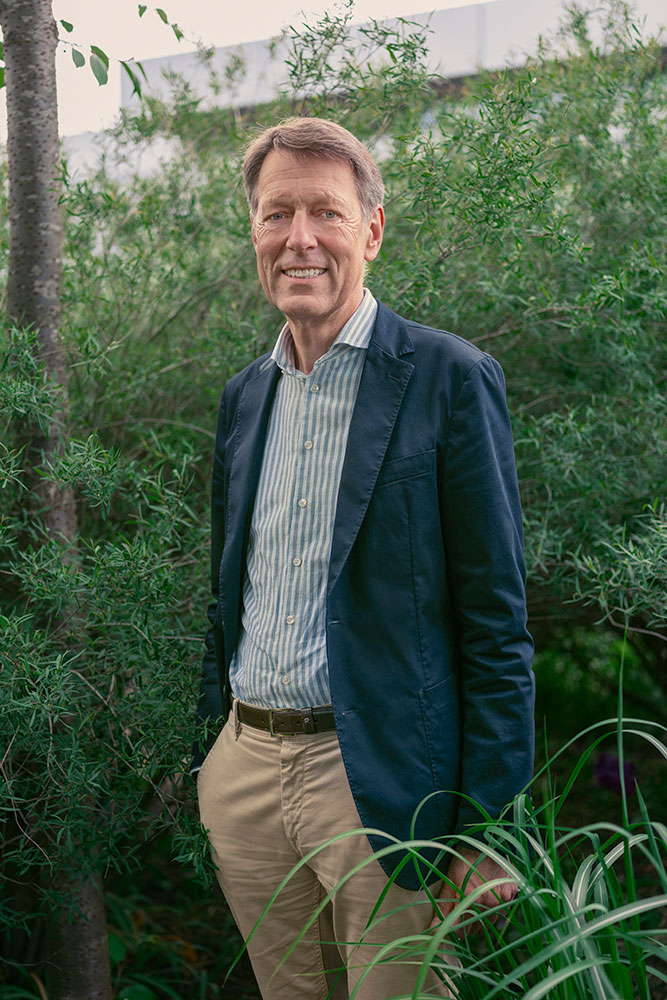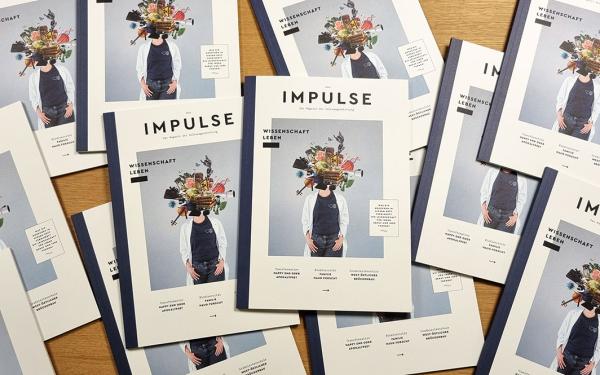A protected space for creative and surprising thoughts

adrienolichon - pexels.com
Protection, care and sufficient free space are not only necessary for plants for optimal development.
What makes a life with science so special, and what framework conditions must be in place to make it possible for universities as our high-performance academic institutions to offer opportunities and fulfillment? A conversation between Enrico Schleiff, President of Goethe University Frankfurt, and the Secretary General of the Volkswagen Foundation, Georg Schütte – moderated by Christine Prußky.
Mr. Schütte, you started your career as a science manager in the early 1990s right after earning your doctorate. Does one have to look far to bring out the researcher in you?
Schütte: Yes and no. Although my work as a researcher was way back, I remember the time well. I know what it means to work in science as a young researcher and to start a family at the same time. I was able to combine both without having to take the long road to a professorship. I have been living out my passion for science for 30 years by working in positions connected with the creation of new knowledge at universities.
Schleiff: To my mind, science management and research are not contradictory. Thinking about what makes universities tick and how they can develop further is a type of science in and of itself. And in practical terms, learning how the university "system" can be further developed is rather like an experiment. However, there is an essential difference in that we cannot entirely control the framework conditions – and often don’t want to – but rather seek to provide impulses to productively prod the "system".
Let's look at whether the idea of a fulfilling life in science is a generational issue. You, Mr. Schütte, were born in the Münsterland in 1962. Mr. Schleiff was born in Luckenwalde in 1971 and grew up in the GDR.
Schütte: A fulfilling life in science is a creative life in which new knowledge is created.
Schleiff: In this respect, there is no difference between the generations. For me, science is also characterized by the fact that there is a protected space for creative and surprising thoughts. Moreover, this free exchange of ideas takes place in discourse with colleagues. The fact that we are able to accompany researchers in their early career phases and at the same time give them the freedom to develop and try out their own ideas is what makes working in science so unique and enriching.
For the "#IchbinHanna" generation*, a good work-life balance is part of the equation.
Schleiff: "#IchbinHanna" triggered an important discussion by looking, among other things, into how the scientific framework might be able to integrate different areas of life into – this might sound rather old-fashioned – a "meaningful" whole. To use an analogy: In physics, performance is calculated by dividing – as opposed to multiplying – work by time. So, on the one hand, we must have the freedom and flexibility to give room to different personalities and inclinations. On the other hand, freedom and flexibility must not lead to a dissolution of boundaries. In other words: Reliability and predictability must not be played off against creative freedom and flexibility – and that is a challenging task.
Schütte: Conceptions about the organization of work are not only divided at universities. Disagreement between generations also exists in the skilled trades and in business. But in science it is particularly harmful to simply adopt the concepts shared by preceding generations. You cannot always do justice to a new idea within a set time frame. As I understand it, the "Hanna" movement is aware of this.

Prof. Dr. Enrico Schleiff, born in Luckenwalde in the GDR in 1971, studied physics in Prague, Mainz, Basel and Montreal. In 2003 he took up postdoctoral research in cell biology and botany. Since 2007, Schleiff has been a professor at Goethe University Frankfurt, where he has also been president since 2021.
Then that takes care of one problem.
Schütte: Not quite: we very much need to think about how to balance the parts of our lives spent outside and inside scientific institutions. We also need to talk about the distribution of opportunities for achieving a fulfilling life in science.
Schleiff: As mentioned, reconciling different individual needs with institutional requirements is challenging – and at times complex. Viable solutions require multilayered negotiation processes that lead to a mutually agreed result. That being said, these results must remain open to discussion and change, because needs and requirements also change. It is important to remember that science is always both a passion and a profession.
Would you, Mr. Schleiff, have stayed in science if the Volkswagen Foundation had not supported you through the junior research group funding program at the start of your career?
Schleiff: I find "what if" questions difficult to answer. At that time, I had just applied for a job in industry. Having become a father, I had to plan for the longer term. The funding from the Volkswagen Foundation came at just the right time.
You must love to hear that, Mr. Schütte!
Schütte: And how! The Foundation truly showed foresight when it set up the program back in 1996 to give younger people more independence in research. The idea was later also taken up in the junior professorship and tenure-track professorships. Offering predictable career paths to a professorship has become standard today.
It sounds like early career researchers have it pretty good in the German science system.
Schleiff: It is indeed true that, as an institution, the university has changed a lot for the better over the past 30 years. The supervision of doctoral students has improved, graduate schools have been created, and today there exist a variety of opportunities to work in positions close to research and teaching. However, we must still work hard on improving the framework conditions.
Most positions in academia are temporary.
Schleiff: The main reason for this is an imbalance in funding. Since base funding has increased only slightly compared to third-party funding, permanent positions are few and far between. And because student numbers have increased to almost three million, the teaching load has risen too. Where once we used to correct 20 homework assignments, today we have 40 and more. We urgently need to do something about this. We must either create more positions – or perhaps ask ourselves about the requisite degree of academization in times of, among other things, skills shortages.
Schütte: Good question. How many university graduates do we really need? At the same time, however, we should also question the hierarchical structures at universities. And career counseling is a third aspect that needs attending to. So far, it has been sadly neglected.

Dr. Georg Schütte, born in Rheine in 1962, has headed the Volkswagen Foundation as Secretary General since the beginning of 2020. A media and communications scholar, he has worked at the Fulbright Commission and the Alexander von Humboldt Foundation. From 2009 to 2019, he was State Secretary at the German Ministry of Education and Research.
Goethe University has a Graduate Academy for Early Career Researchers. It took almost a decade to set it up. What was the problem?
Schleiff: I can understand how, from an outsider’s perspective, that impression can arise. But GRADE, our Goethe Research Academy for Early Career Researchers, was based on the structures that existed then, and further development is by definition a continuous process. Starting last year and into 2023, for example, we adjusted our job concept for positions below the professorship to offer more researchers plannable career paths. We foster independence, internationality, and transdisciplinary collaboration. To become even better in this regard, we would like to see more support from politics and science-funding organizations.
Only 16 percent of doctoral students in Germany intend to pursue a university career, compared to 22 percent in 2019. The OECD warns there could soon be a shortage of researchers. Do you share this assessment?
Schütte: I am cautious about making predictions. However, we should keep a close eye on where highly qualified talent is going. How attractive is the German university job market in the hard sciences, for example? If we compare what doctoral students and postdocs earn in Germany and at ETH Zurich, the international competition is clearly evident.
Schleiff: I would approach the question differently. The fact that scientists constantly have to develop new skills and competences does not contribute to making this professional field more attractive. If, on the one hand, we assume that a fulfilling life in science is linked to creativity and freedom, but on the other hand look at the growing catalog of requirements, that contradiction becomes obvious. Innovative teaching, publications, third-party funding, patents, science communication – had I been confronted with such a magnitude of expectations as a young person, my passion for science might well have waned
Schütte: Symptoms of being overwhelmed are always there. They are difficult to deal with. But we need to create clarity about what universities can and cannot do. Above all, we need to make it clear that universities cannot do everything at the same time. Research and performance profiles must be more sharply contoured.
Schleiff: Unfortunately, the general commitment to such differentiation is not reflected in financing and funding policies. Instead, what I have observed over the past 15 years is a convergence of profiles. As opposed to building on existing strengths, policy makers are assigning the same set of tasks to all universities.
Do universities still attract the best minds?
Schütte: How to identify the best minds is also a major topic for us at the Foundation. We are currently funding research on evaluation systems in science. What is good science? What kind of science do we need? We expect to have robust findings in three to four years.
Schleiff: I would like to have the results already today. I personally do not know whether we attract the very best minds to our universities. What I do know beyond any doubt, however, is that we are already gaining lots of truly outstanding personalities. Incidentally, when talking about their work, all of their faces light up.
Mr. Schleiff, you enjoy doing jigsaw puzzles. Does this talent help you in everyday life?
Schleiff: People around me know that I appreciate a dynamic environment and that I want to implement new things quickly and move them forward – I'm said to be impatient (laughs). Doing jigsaw puzzles helps me relax in my free time. The main lesson is: Some things simply take time. You have to look at all the pieces patiently and ask yourself where each piece might fit. At the same time, this type of approach is also central to my work. I am constantly asking myself how this part can fit with that part and how they can yield a bigger picture that is ultimately more than the sum of its parts.
What secret gift helps you in your work, Mr. Schütte?
Schütte: Without wanting to sound presumptuous: Empathy. I enjoy meeting people and hearing about what ignites their enthusiasm. I then ask what can we do as a foundation to keep that flame burning?
* The hashtag #IchbinHanna was a direct response to a video released by the German Federal Ministry of Education and Research in 2021 portraying a fictitious early career researcher. The video provided an outline of the German Act on Fixed-Term Employment Contracts in Academia (Wissenschaftszeitvertragsgesetz, WissZeitVG). The Ministry's portrayal was subject to widespread criticism because, in the eyes of many, it failed to touch on issues unique to the German academic landscape, like fixed-term employment and the ensuing poor career plannability, summed up under the Twitter hashtag #IchbinHanna.

